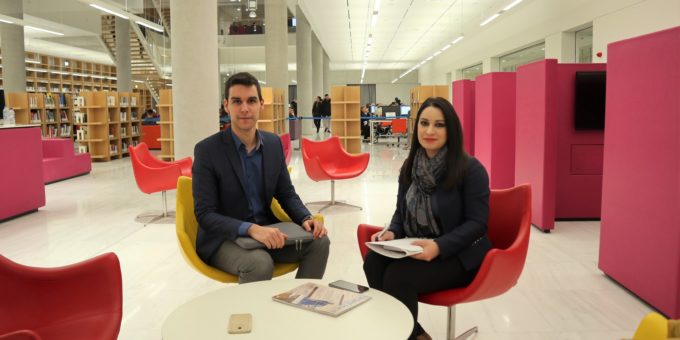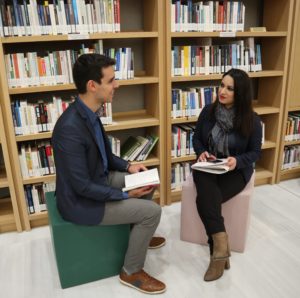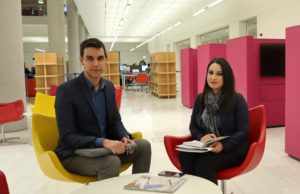
Interview to Athina Korovesi
Travelling overseas has always been priceless for Mr. Panagiotis Kyriakopoulos, the young Greek economist, who studied at the Athens University of Economics and Business. It is remarkable that his research has been distinguished by the academic community, as his study has been focused on the Technology Parks and on the transfer of knowledge from the developed countries to the emerging ones. His research is conducted during his doctoral dissertation at the Adam Smith Business School in Glasgow, United Kingdom, where he is also part of the University’s research staff.
In his interview at Politis Online and Ms. Athina Korovesi, he explains with passion for his subject everything we need to know about the Technology Parks, given that he visits Mexico on a regular basis for the purposes of the accomplishment of his team research and the exploration of the potentials and opportunities that are being offered by the “tech-cities”.
Whether the phrase “Technology Parks” is familiar or not to the general public, the following interview serves as a driving force for its inclusion in our daily conversations to the direction of the search for opportunities and possibilities offered by these “tech-cities”. After all, Technology Parks have already being created in Greece as well, given the launch of the two major “innovation cities”, in Attica and in Thessaloniki.
Our discussions’ main theme does not goes beyond the strict limits of Panagiotis’ academic career, but to other significant issues that could affair the though of a young scientist. Currently staying between Scotland and Mexico, he is a distinguished scientist who has received awards and scholarships from an early age, that helped him to achieve his goals and dreams, as he says. “We have to support the academic excellence from the first to the last stage of the studies. Excellence should be recognized throughout them” he stresses, wanting to convey a message to Greek politicians, both for the establishment of scholarships as well as for importing courses about the entrepreneurship at the first stages of the education system, in order the entrepreneurial spirit of the young people to be encouraged. “We must take into consideration that some children do not aim to enter the university university community. Instead they might want to get involved in entrepreneurship” he adds, referring to hidden everyday truths.
Brexit developments consist another topic of our conversation. Besides, Mr. Kyriakopoulos talks to us about life in Mexico, while our discussion extends to issues such as the vote of the Greeks who live abroad. In addition, we discuss the matter of the private universities in Greece following the positive vote for the equivalence of the curricula of the greek public universities and private colleges at the greek parliament voting procedure. Panagiotis points out meaningfully “Our universities have nothing to envy the universities abroad”.
The very interesting views of Panagiotis Kyriakopoulos are presenting in the interview that follows right now, that was held at the National Library of Greece that is located at the Stavros Niarchos Foundation Cultural Center (SNFCC), a knowledge incubator full of children’s happy voices springing from its corridors, that can assure us that the new coming generations have a lot in common with this distinguished and award-winning young economist that sits across me.

Athina Korovesi: From the Athens University of Economics and Business to Glasgow and Mexico. Dear Panagiotis, describe this journey throughout the years.
Panagiotis Kyriakopoulos: In 2016, I went to Glasgow to attend my Master at the University of Strathclyde. Then I returned to Greece where I worked at one of the largest construction companies in the country. After that, in 2019, I made the decision to pursue a doctoral degree at the University of Glasgow in the United Kingdom. At the same time, I was being occupied by my doctoral research and also being a member of a research team, which is studying the technology parks in Mexico.
A.K.: Let’s continue with the analysis of the term “Technology Park”. What exactly it means and which are its characteristics?
Panagiotis Kyriakopoulos: The characteristics of the Technology Parks include: Strong links with the Universities and the Research Centers; Encouragement of new companies’ development; Support for technology transfer and entrepreneurship, as well as contribution to the local community development.
Technology parks include operators such as Academic and Research Foundations and Institutes, small and large Companies, as well as technology support and transfer agencies. It is important to notice that Technology Parks provide high-level specialized services such as infrastructure and incubator services (offices and laboratories), public services such as telecommunications infrastructure, networks, conference rooms, library, restaurant, networking with research laboratories and access to research labs, international business networking, research institutes, operators, consulting services (access to finance, training, business planning and development, marketing, and International Networking).
A.K.: Technology Parks in Greece. The creation of the two “Innovation Cities” -as they called- in Attica and Thessaloniki, is already underway. What will change upon their creation?
P.K.: The Technology Parks in Greece are valuable through the cooperation of their members, the innovative environment, the collaboration with high quality infrastructure research laboratories and the presence of specialized human resources. In the modern digital times, the Technology Parks must be the representatives of the industrial periods.
In Greece, the Technology Parks should become the mechanism for the technology transfer and be the tools for the regional development, as they encourage the creation of new high-tech companies, represent the entrepreneurship culture and create new jobs. A modern tax framework is also needed to provide incentives, high quality infrastructure, such as: transport, telecommunications and energy, and specialized human resources.
For instance, the Technology Park of Cambridge is considered as a success case study since it has managed to use properly its links with the universities of the region and it has managed to attract several high-tech companies, by creating new quality jobs.
In addition, Mjardevi and Berzelius Technology Parks in Linkoping, Sweden, have contributed to the local development of their cities, for the reason that more than two hundred new companies were created. Many major companies such as Ericsson, Volvo and Saab have contributed to the development of the Technology Parks.
The creation of the technology park in Thessaloniki will encourage significantly the business culture. Particularly, the 4th generation Technology Park that is going to be created in Thessaloniki, the “ThessIntec”, will encourage the business culture and the investment field in the economy of Knowledge.
A.K.: You are a member of a distinguished team of researchers for the transfer of know-how practices. Which are your actions and initiatives as well as your own future plans within the team?
P.K.: It is a great honor to be a member of a prestigious research team in the United Kingdom. We have been assigned to map all the teams (stakeholders) in Mexico’s Technology Park Ecosystem and to make a list of all those mechanisms that will lead a small and medium-sized firm outside the Mexico borders. I would like to point out, that this study is being funded by the British Council in order to create a structured business framework for Mexican SMEs. The purpose of this project is the knowledge transfer to the Mexican Economy by the developed Technology Parks of the United Kingdom.
A.K.: Does your research has tangible results right now? Is there also a “ceiling” in terms of results and expectations?
P.K.: We presented our findings at the two feedback workshops that took place in Monterrey and Chihuahua, in November 2019 and January 2020, and we pointed out the weaknesses of the internationalization mechanisms of the Mexican SMEs. Our plan is to extend the research to other technology parks in Mexico, because there are 36 campuses.
A.K.: How is to live in Mexico? Is it offered for immigration? Could you please also proceed to a comparison of living in Greece and the United Kingdom?
P.K.: Life in Mexico is pretty much hard, because it is an emerging country, with very low incomes. Taking into account that the local people speak Spanish, it is sometimes difficult for them to understand the English language. On the other hand, the United Kingdom could be considered as an ideal country to study and work because of its multiculturalism, the English language and for the reason that we can still travel unconditionally in Britain. However, this will unfortunately change after Brexit. Also, there are many Greeks in the United Kingdom.
A.K.: I would like to discuss about Brexit. Is there something that has changed in Scotland? Are there any fears or worries that concern the Scottish people?
P.K.: The truth is that the citizens of Scotland are worried, because they don’t know what is going to happen after that. However, the Scottish government believes that staying in the EU is the best for Scotland and the U.K. It has been pushing the UK government to allow for a second referendum. Of course, things are going to be different in terms of transportations, but there is a Settlement Scheme that will make easier the life of the citizens in the UK.
A.K.: With the change of the decade, the financial crisis in Greece may seems a bit distant. At least, it seems a little further away than last year. Having a distinguished economist in front of me, it is inevitable to ask what has gone wrong in your opinion all these years and what should we had done to avoid that situation?
P.K.: I think that a lot of mistakes have been made in the past, and I think that economic crisis is caused due to spiritual and moral crisis. Besides that, I think that there are two main reasons which contributed to the financial crisis. One reason for the economic crisis in Greece, is the indebtedness from the European Bank and the fact that Greece could not afford it, and the other fact is consumers credit that could not be paid back. There were also some wrong decisions that have been made at the political level.
A.K.: Did your distinctions made it easier for you to access the job market?
P.K.: They certainly helped me; otherwise it would have been quite difficult for me to find a job.
A.K.: I would like your comment about the excellence. Much has been said, much has been written in Greece. You, as an excellent person, who believes that the excellence is part of his principles, what you would like to say to the greek politicians, to the young people, and to all of us about this topic?
P.K.: I would like to tell them that the excellence should be supported by foundations. As a result, excellent students could be able to study in Greece or abroad. Additionally, the government should not shut down the Pilot Schools. Students should be supported from the first to the last day of their studies.
A.K.: At this point, I would like to ask you a last question about the public and private education. What is your opinion about this priority topic of the agenda of the governing party now (New Democracy) in Greece?
P.K.: I have attended public school and I believe that there are excellent teachers. I also studied at the public Athens University of Economics and Business, where I was being taught by great teachers of management and economics. However, the International Universities are superior to the Greek Universities in terms of infrastructure and safety.
A.K.: Thank you very much.

Curriculum vitae of Panagiotis Kyriakopoulos
Panagiotis Kyriakopoulos is a Researcher at the University of Glasgow – Adam Smith Business School in the United Kingdom. His research has been focused on the internationalisation of small and medium-sized enterprises, international entrepreneurship and international business strategy. He graduated with distinction from the Department of Business Administration and Management of Athens University of Economics and Business. He conducted a Master of Science Degree programme in International Management at Strathclyde Business School in the United Kingdom and he was awarded by the Alexander Onassis Foundation. He also finished his Bachelor of Science and Master of Science first (valedictorian). His dissertation thesis was considered as “Outstanding” and was awarded with Dean’s Commendation for the best project in the programme. He was awarded for his academic performance by foundations and organisations. He has worked for the US multinational company Marsh & McLennan Companies and the Intrakat Group (Intracom Holdings).
To read the interview with Panagiotis Kyriakopoulos in greek, visit www.athinakorovesi.gr/index.php/2020/01/24/ellada-skotia-mexico-to-taxidi-tou-ellina-ereuniti-pou-mas-muei-sta-texnologika-parka/ (First publication on Politis Online, 24/01/2020).